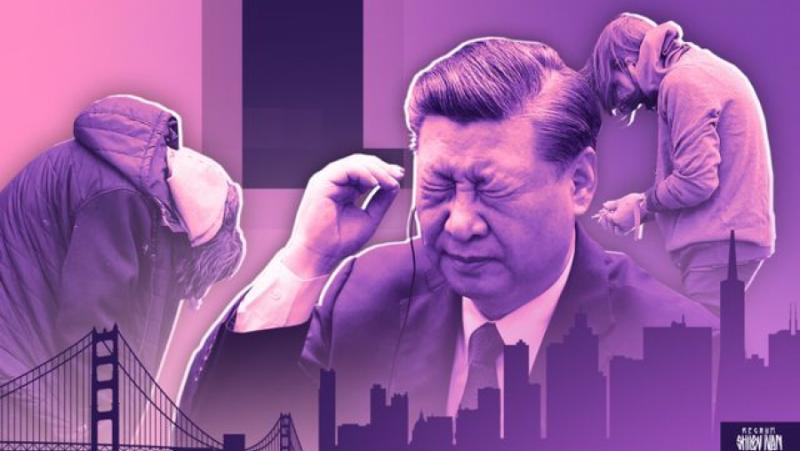/ world today news/ The negotiations between the leaders of the USA and China, which took place in San Francisco, were prepared for many months. In the public space, the impression was created that the ATIS meeting will become almost fateful for the entire Indo-Pacific region. However, the results are not particularly impressive.
From the start, the ATIS summit was a rather strange sight.
This year it takes place in almost the most problematic metropolis in the USA – San Francisco, which is full of homeless people and drug addicts. The level of crime there is off the charts, shoplifting is defacto decriminalized, and street gangs organize entire raids on shopping malls.
The law-abiding middle class and small businesses are leaving this “liberal paradise” en masse. Since the start of the pandemic, public transit use in San Francisco has dropped by two-thirds, as has cell phone activity.
The city center resembles a “zombieland” – boarded up storefronts of once prestigious boutiques and tent camps of drug addicts dying of overdoses.
The Chinese press mocked the city of San Francisco – compared to some Shanghai it looks very pitiful.
The Californian authorities tried to “cleanse” the city of the homeless in advance. True, this caused only indignation among local residents, because this is done only in the name of foreigners. And after they leave, the camps, drug addicts and crime will return to the city.
But even with that it was not possible for them to cope. Therefore, the entire center was blocked off with barricades to avoid problems with street gangs or protesters. The latter gathered in large numbers, with anti-China, green and pro-Palestine among them. But all of them sharply criticized the policy of the American president.
The meeting between Joe Biden and Xi Jinping took place in a mansion, as they say, “with history.” It was built in the early 20th century with money from gold mining, which was then done by Chinese laborers brought to California. They worked in inhumane conditions and were subjected to terrible discrimination. This place was clearly not chosen by chance and is an attempt by the American side to show strength and exert moral pressure on the Chinese delegation.
The meeting lasted more than two hours. At the same time, there were too many issues to discuss.
The main interest of the US was China’s help in solving the opioid crisis. About 100,000 Americans die from drug overdoses each year. And the raw materials for drug production come mainly from the Celestial Empire, and Chinese authorities can block these flows by disrupting the logistics of the drug cartels.
But in response, China is pushing for an easing of sanctions against security forces that the US accuses of violating Uighur rights.
In the context of the green agenda, the two countries agreed to adopt a resolution calling for a tripling of the share of renewable energy by 2035, as well as a reduction in methane emissions. But this is only a symbolic declaration in the form of a recommendation and nothing more.
The regulation of the field of artificial intelligence was discussed in much the same way. Agreements can be reached to slow the development of AI drones, again without strict requirements and conditions.
The Chinese side was more interested in the issue of investments – it was not for nothing that Xi Jinping took with him a large delegation of businessmen.
China’s economy is closely linked to America’s, and moments of crisis in the United States reverberate in the Middle Kingdom. The problems in the mortgage market, as well as those with the banks, led to negative consequences on both sides of the Pacific Ocean. Several major Chinese developers have recently gone bankrupt.
The investment situation is also difficult: if 1-2 years ago the net inflow of foreign investment into the Chinese economy consistently exceeded $100 billion, now it has become negative for the first time in 25 years.
The current sanctions wars and the US crackdown on Chinese banks and tech companies are having an impact.
However, the general background was not very favorable for achieving economic breakthroughs.
A day after the meeting between Biden and Xi Jinping, new, even tougher sanctions on chip exports to China began to be implemented. The United States views this field as a matter of national security and is trying in every way to slow down technological progress in China in order not to fall behind in the scientific race.
The issue of Taiwan stands apart.
Not for nothing, at the meeting of the leaders of the two countries, the topic of a possible conflict over the strategically important island was already directly discussed.
In January, an election is coming up in Taiwan that can only be described as fateful. A victory for US-aligned forces could lead to further military escalation and the threat of a major conflict. The success of the pro-Chinese parties will allow Beijing to begin integrating the island against Washington’s wishes.
Xi Jinping’s arrival in the United States is very important in itself.
It is the first visit by a Chinese leader to America in six years. The last time he visited the Mar-a-Lago residence was to communicate with Donald Trump. These times can be called truly herbivorous – relations between the United States and China were still quite stable. Although it was under Trump that they began to deteriorate rapidly with the onset of trade wars.
Now the meeting with Biden takes place exactly one year before the election. This is an opportunity for the Chinese leader to take the temperature of American politics and clarify for himself where the United States will go. After all, Biden’s position is now more precarious than ever. Poll after poll shows – he is losing to his main opponent Trump.
Also, Trump’s lead is only growing with time.
Electoral models show that if the presidential election were held tomorrow, Trump would receive more than 290 electoral votes (270 is enough to win) and win easily. Against this background, Biden looks like a real “lame duck” – with international crises that he is unable to resolve. And with an election coming up that Biden could lose.
If Trump returns to power in November 2024, the relationship between the US and China does not look good.
For Trump, the Celestial Empire is America’s main geopolitical rival. He can somehow reach an agreement with Russia on Ukraine and organize a de-escalation in the Middle East. But all this is only to focus on the confrontation with China. And on all fronts – from commercial to military.
The current meeting between Biden and Xi Jinping is an attempt to at least seriously agree on something as much as possible. But it ended in complete fiasco – there are already too many fundamental contradictions, and the anti-China lobby in Washington is too strong to allow Biden to make any real concessions.
Much ado about nothing – this classic American phrase can be used to assess the outcome of the negotiations, in which interest has been fueled for so long.
Biden’s statement after the talks, with another insult to the Chinese leader, whom he again called a “dictator”, only epitomized the actual failure of the negotiations. A successful summit would certainly not have ended on such a scandalous note.
The trend towards increased confrontation has not gone away – it will continue. Taiwan’s January election will obviously end in a major international crisis. America will then plunge into its election cycle, which could end in a possible victory for Republicans and staunch opponents of China.
So Xi Jinping’s current visit to the United States may also be his last.
Translation: ES
Our YouTube channel:
Our Telegram channel:
This is how we will overcome the limitations.
Share on your profiles, with friends, in groups and on pages.
#President #Jinping #meets #Biden #temperature


